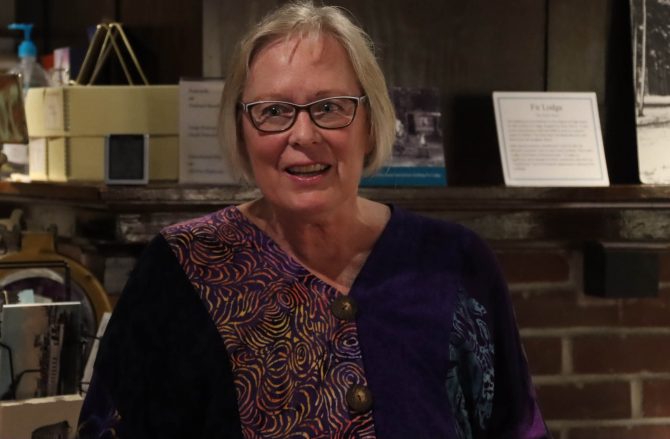By Tracy Record
West Seattle Blog editor
A celebration of a gift was also a reunion 160+ years in the making on Saturday at the Southwest Seattle Historical Society’s Log House Museum.
The gift: More than 30 letters written in the second half of the 19th century, mostly by a major figure in early Seattle settler history, Dr. David S. “Doc” Maynard.
The reunion: The celebration began with Chief Seattle‘s great-great-great-great-grandson Ken Workman welcoming Maynard’s great-great-great-great-grandchildren.
In two languages, he offered the welcome he said his “grandpa” would have offered: “Come ashore, my friends, onto this land of the Duwamish,” and observed, “We’re all gathered again, on this old, old land, in this old, old house.” You can hear his words of welcome about 1:45 into the event video recorded by West Seattle historian, author, and journalist Clay Eals:
The Historical Society says the letters will be a game-changer in the understanding of Seattle history – providing some of Maynard’s perspective on how the city came to be. They were almost lost to time and the elements, kept for years in a shed near Seola Beach, the family said, as they told the story: Many of the letters were written by Maynard to his son Henry thousands of miles away, trying to convince him to move west. He even referred to Chief Seattle in the letters, they said, at one point describing him as “the old Indian I named the city after.”
Henry and his father – who left Henry’s mother to move west – were not close, and he never even visited Seattle, so the family isn’t sure why he saved the letters. Henry’s great-great-great-grandson Chris Braaten explained that they were found “stuck between magazine pages, stored in a shed at Seola Beach.” How they got there isn’t known either, but eventually Chris learned about them from his mom, and started transcribing them some years ago. Another relative helped. All but about half a dozen have been transcribed.
Along with the early saga of the city of Seattle, they also tell a deeply personal story – in one letter, Maynard’s second wife Catherine informs Henry that his father has died (that was 1873); in another, Maynard reacts to news that he has become a grandfather. None of the modern-day descendants carry that surname, Chris explained; it died out a couple generations ago because “many branches [of the family tree] had no sons, or no children at all.”
Mary Ellen Braaten explained how the donation happened, saying family members were inspired after local historians Paul Dorpat and Jean Sherrard appeared at West Seattle’s Paper Boat Booksellers, talking about their book “Seattle Now and Then: The Historic Hundred” (edited by Eals), which includes photos of Maynard’s still-standing historic Alki house (mentioned here in 2017).
They met with the SWSHS’s curator and collections manager, Tasia Williams and Rachel Regelein, and eventually realized, “Seems like this is where (the letters) belong.”
Williams offered gratitude that “these letters are coming home to the people who live on this land,” calling it “an incredibly important addition to our collection.” She said the museum is starting immediately on the work of figuring out how to best stabilize, clean, and preserve the letters, with a professional conservator coming in a few days to take a look.
Another SWSHS associate who has already begun studying the letters, volunteer curator Phil Hoffman, said they will bring “better insight and valuable understanding of our heritage.” That includes a clearer picture of the business dealings between Maynard and another key figure in the city’s early days, Charles Terry. A land swap between the two brought Maynard to Alki. Hoffman read from the deed, including its line describing the land’s boundaries, down to “a post on the beach.” Alki was a township all its own for a time, and the letters speak of that, as well, including the businesses it held, from a general store to a ships’ chandlery. (Here’s the story of one business back then.)
Before Saturday’s event concluded, there was time for Q&A. One attendee wanted to know the value of the letters. They can’t be assigned a monetary value, but the word rang from multiple corners of the room:
“Priceless.”
WHAT’S NEXT: The Historical Society intends to make the transcriptions available online, and will likely eventually be able to show the letters in an exhibit; they’re also considering publishing a book about them. You will also be able to learn more about “Doc” Maynard later this year at the annual SWSHS “If These Walls Could Talk” historic-home tour – which will be at the mentioned-earlier historic Maynard house (whose current owner was at the museum for Saturday’s event).






| 8 COMMENTS